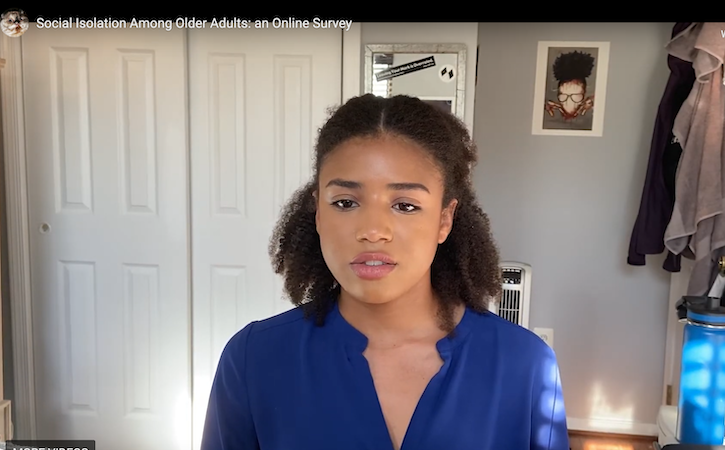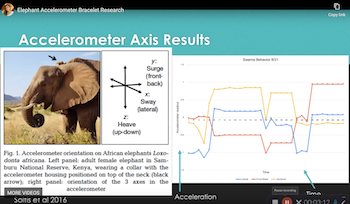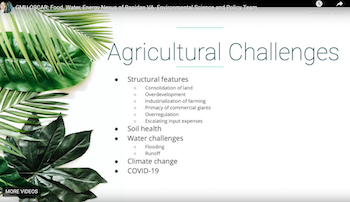
In her group's virtual presentation, Mason sociology major Karmen Perry walks audience members through the group's research findings on isolation and loneliness in older adults.
Karmen Perry’s summer research plan was supposed to include a two-week trip to Japan to study social isolation and loneliness among older adults. When the trip was canceled because of COVID-19, Perry made the most of her disappointment—she incorporated the pandemic into her research.
Perry’s was one of more than 30 projects on display Friday at the Virtual Celebration of Student Scholarship and Impact, hosted by George Mason University’s Office of Student Scholarship, Creative Activities and Research (OSCAR). The event, representing programs across the university, is part of the Mason Impact initiative.
“Since COVID was brand new, there was no research to show what kind of questions or what kind of experiences people are having,” said Perry, a senior sociology major and Honors College student from Greensboro, North Carolina. “We had to conduct all of our interviews online, which was kind of ironic, because our results found that technology isn’t as comprehensive as it could have been or should have been [in long-term care facilities].“

Biology major Alexa Herrerias monitored elephants' movements at Smithsonian’s National Zoo.
Biology major Alexa Herrerias also had to shift course. She was supposed to research Asian elephant hormones at Smithsonian’s National Zoo in Washington, D.C. When COVID-19 restricted lab availability, Herrerias shifted her focus to video surveillance to monitor the animals’ movements, behavior and space usage to learn more about how zoos can provide the optimum habitat for captive endangered elephants. Accelerometer bracelets yielded data that enhanced her research.
Even from afar, Herrerias feels like she made two new friends she can recognize by their personalities and behavior.
“That’s one thing I’m looking forward to if I go to the zoo—oh my God, that’s Spike, or oh my God, that’s Swarna!” said Herrerias, a senior from Mexico City who will graduate in December.
Projects at the Virtual Celebration of Student Scholarship and Impact covered a broad scope of subjects, including French linguistics, Alzheimer’s disease, explosives detection, the portrayal of Indian Americans in popular literature, ant biodiversity, queer liberation pioneers, e-cigarette countermarketing, microplastics, Floridian forests, drug-related violence in the Philippines, and student-run businesses, among others.

“The Food, Water, Energy Nexus in Rapidan, Virginia,” presentation won an audience recognition award.
Two projects were singled out for recognition based on a four-day audience survey: “Belonging in the Nation’s Capital: Mutual Aid as a Response to Racialized Displacement,” from sociology major and Honors College student Kyler Buckner, and “The Food, Water, Energy Nexus in Rapidan, Virginia,” from Jordan Boyle, Seth Mahowald and Meghan Widmaier.
OSCAR assistant director Karen Lee said she was impressed with how students and their faculty mentors were able to adapt their research methods by analyzing data, using software and video, or even by acquiring equipment to use safely at home.
Presentations are generally made in person via poster, not virtually via pre-recorded videos. Visitors to the virtual event engaged with participants by leaving questions and comments.
“While this summer is not what we could have predicted in February when summer projects were planned,” Lee said, “the students and their mentors worked hard so that students had an authentic experience.”
